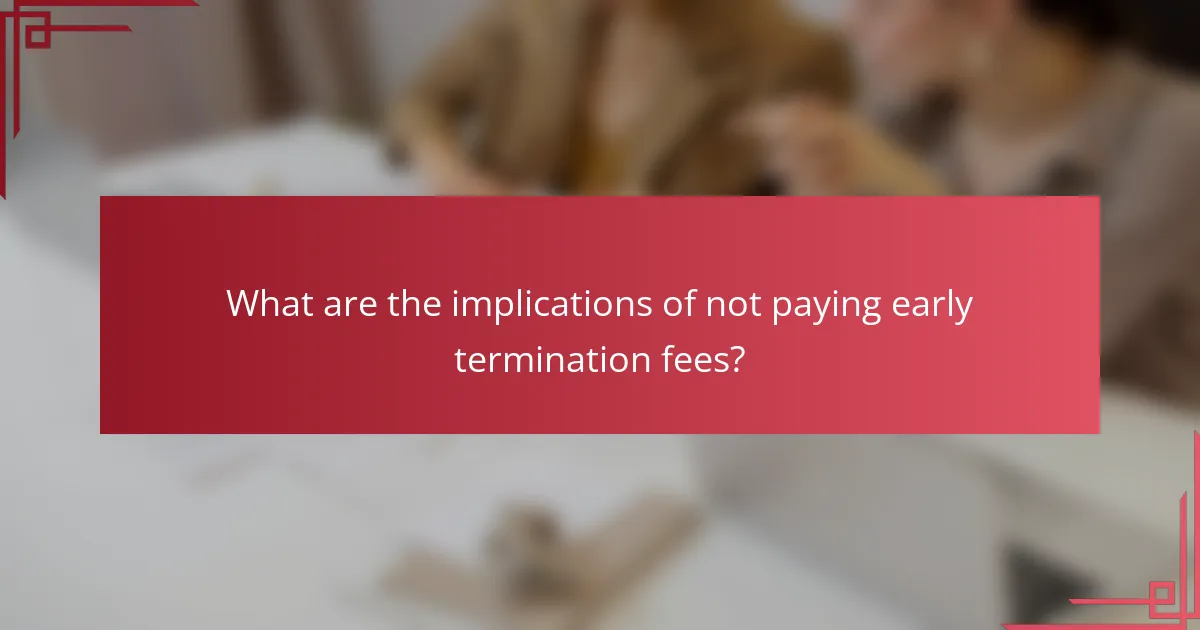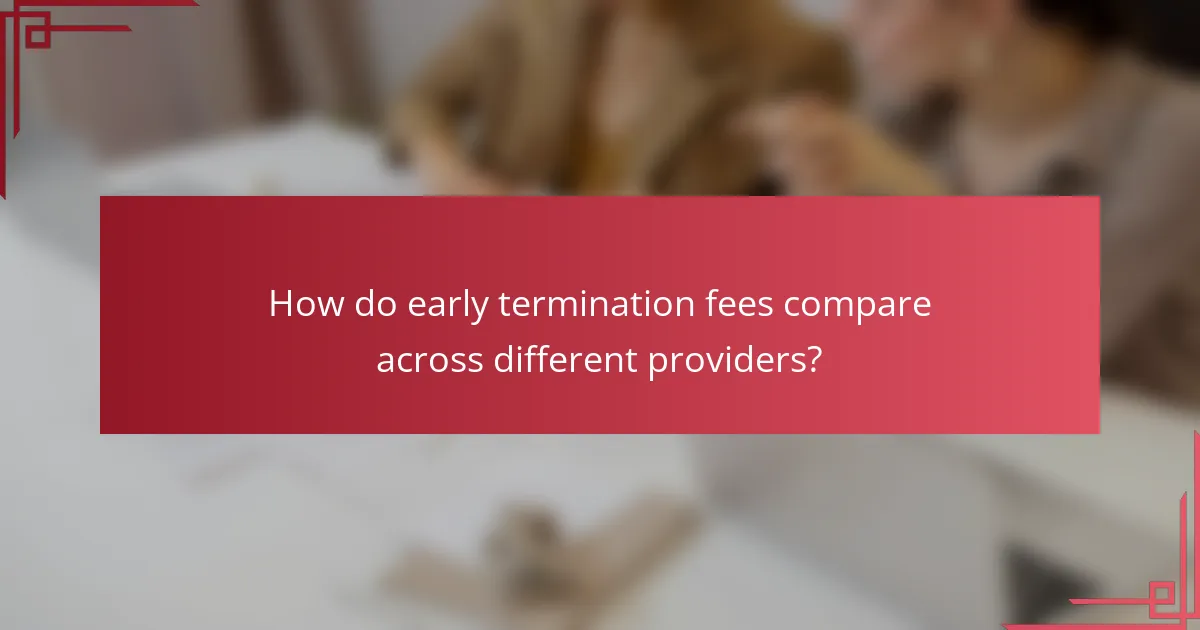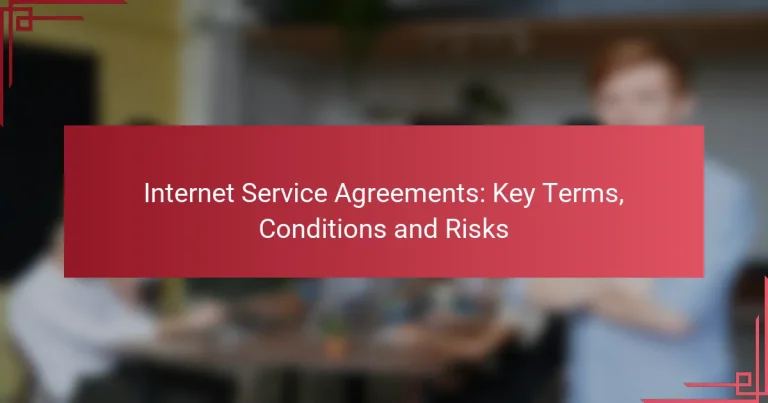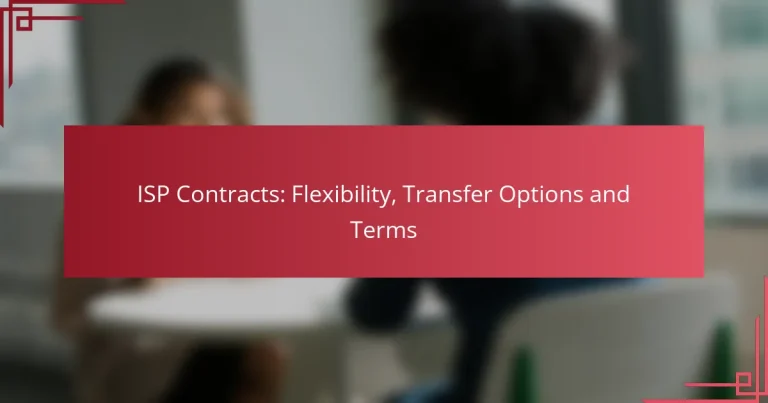Early Termination Fees: Costs, Conditions and Exceptions
Early termination fees (ETFs) are charges that service providers impose when customers decide to end their contracts before the agreed-upon term. These fees serve to compensate providers for lost revenue and can vary widely depending on the type of service and the specific terms outlined in the contract. Understanding the costs, conditions, and potential exceptions associated with ETFs is crucial for consumers considering early contract termination.

What are early termination fees in the United States?
Early termination fees in the United States are charges imposed by service providers when a customer ends a contract before its agreed-upon term. These fees are designed to compensate the provider for lost revenue and can vary significantly based on the type of service and the terms of the contract.
Definition of early termination fees
Early termination fees (ETFs) are penalties that customers must pay if they cancel a service contract prematurely. These fees are typically outlined in the service agreement and can be a flat rate or calculated based on the remaining months of service. Understanding the specific terms of your contract is crucial to avoid unexpected costs.
ETFs can serve as a deterrent against early cancellation, ensuring that customers fulfill their commitments. However, the amount and structure of these fees can vary widely, making it essential to read the fine print before signing any contract.
Common industries with early termination fees
Several industries commonly impose early termination fees, including telecommunications, cable and satellite services, and gym memberships. In telecommunications, for example, customers may face ETFs when canceling mobile phone contracts, which can range from $100 to $350 depending on the provider and the remaining contract duration.
In the cable and satellite industry, ETFs are often tied to promotional pricing, where customers receive discounted rates in exchange for a longer commitment. Gym memberships may also include ETFs, typically requiring members to pay a fee if they terminate their contract before a specified period, often around $50 to $200.

What are the typical costs of early termination fees?
Early termination fees (ETFs) are charges imposed when a contract is ended before its agreed-upon term. These fees can vary significantly based on the type of service and the specific terms outlined in the contract.
Average fee ranges for contracts
Typically, early termination fees can range from a few hundred to several thousand dollars, depending on the service. For example, mobile phone contracts often have ETFs between $100 and $350, while lease agreements for apartments may charge fees equivalent to one or two months’ rent.
In some cases, contracts may specify a declining fee structure, where the amount decreases the longer you remain under the agreement. This means that if you terminate early, you might pay a higher fee if you are near the start of your contract.
Factors influencing fee amounts
Several factors can influence the amount of an early termination fee, including the type of service, the length of the contract, and the remaining term. For instance, longer contracts may have higher fees, while shorter contracts might have lower penalties.
Additionally, some providers may offer promotions or discounts that can affect the ETF. Always review the terms of your contract to understand how these factors apply to your specific situation.

What conditions apply to early termination fees?
Early termination fees (ETFs) are typically charged when a customer ends a contract before its agreed-upon term. These fees can vary based on the type of service, the remaining contract duration, and specific conditions outlined in the agreement.
Contractual obligations
Contractual obligations define the terms under which early termination fees may be applied. Most contracts will specify the duration of the agreement and the associated penalties for breaking it early. It’s essential to review these terms carefully, as some contracts may allow for fee waivers under certain circumstances, such as job loss or relocation.
For example, a mobile phone contract might impose a fee that decreases over time, reflecting the remaining months of service. Understanding these obligations can help you anticipate potential costs if you need to terminate early.
Notice periods required
Notice periods are often required before terminating a contract to avoid incurring an early termination fee. Many service providers require customers to notify them a certain number of days in advance—typically ranging from 30 to 60 days—before cancellation. Failing to provide adequate notice can result in additional charges.
To navigate this effectively, check your contract for specific notice requirements. Mark your calendar to ensure you comply with these timelines, as this can save you from unexpected fees when you decide to cancel your service.

What exceptions exist for early termination fees?
Exceptions for early termination fees can vary depending on the contract type and jurisdiction. Common exceptions include legal protections for consumers and specific provisions for military service members.
Legal exceptions in consumer contracts
Many jurisdictions have laws that protect consumers from excessive early termination fees. For instance, contracts for services like telecommunications often have regulations that limit the fees a provider can charge if a consumer terminates the contract early.
In the United States, the Federal Trade Commission (FTC) enforces rules that may prevent companies from imposing unreasonable fees. It’s essential to review your contract and local laws to understand your rights and any applicable exceptions.
Exceptions for military service members
Military service members have specific protections under the Servicemembers Civil Relief Act (SCRA). This federal law allows them to terminate certain contracts, including leases and cell phone agreements, without incurring early termination fees if they are called to active duty.
To qualify for these exceptions, service members must provide proper documentation, such as orders for deployment. It’s advisable to notify the service provider promptly and follow their procedures to ensure compliance with the SCRA.

How can you negotiate early termination fees?
Negotiating early termination fees can significantly reduce your financial burden when ending a contract prematurely. Understanding your rights, the terms of your agreement, and effective negotiation strategies can help you achieve a more favorable outcome.
Strategies for negotiation
Start by reviewing your contract to identify any clauses related to early termination fees. Look for provisions that may allow for waiving or reducing the fee, such as service disruptions or changes in terms. Prepare to present your case clearly, emphasizing any relevant circumstances that justify your request.
Consider leveraging your loyalty or history with the provider as a bargaining chip. If you have been a long-term customer, mention your past payments and relationship to strengthen your position. Additionally, researching competitor offers can provide leverage; if similar services are available at lower costs, use this information to negotiate a better deal.
When to seek legal advice
Seek legal advice if you believe the early termination fee is unjust or if the contract contains ambiguous terms. A legal professional can help clarify your rights and obligations, ensuring you understand the implications of terminating the contract early. This is especially important if you face significant penalties or if the contract involves substantial financial commitments.
If negotiations with the service provider stall or if you encounter aggressive tactics, legal counsel can provide guidance on the best course of action. They can also assist in drafting communication that clearly outlines your position and any legal grounds for your request, potentially leading to a more favorable resolution.

What are the implications of not paying early termination fees?
Not paying early termination fees can lead to significant financial and legal consequences. These fees are often outlined in contracts, and failing to settle them can result in damage to your credit score and potential legal actions from service providers.
Credit score impact
Unpaid early termination fees can negatively affect your credit score, which is a crucial factor in determining your creditworthiness. Providers may report the unpaid fees to credit bureaus, leading to a drop in your score by several points, depending on your overall credit history.
A lower credit score can hinder your ability to secure loans, obtain credit cards, or even rent an apartment. It is advisable to address any outstanding fees promptly to mitigate these risks.
Potential legal actions by providers
If early termination fees remain unpaid, service providers may pursue legal action to recover the owed amount. This could involve sending your account to collections, which can further damage your credit and lead to additional fees.
In some cases, providers may file a lawsuit to recover the debt. Legal fees and court costs can add to the financial burden, making it essential to resolve any disputes regarding early termination fees as soon as possible.

How do early termination fees compare across different providers?
Early termination fees (ETFs) vary significantly among service providers, often influenced by contract terms and the type of service. Generally, these fees can range from a few hundred to over a thousand dollars, depending on the provider and the remaining contract duration.
Understanding early termination fees
Early termination fees are charges imposed when a customer cancels a service contract before its expiration date. These fees are designed to recover costs incurred by the provider for subsidizing equipment or services. Understanding the specific terms of your contract is crucial to avoid unexpected charges.
Factors influencing early termination fees
Several factors can affect the amount of an early termination fee, including the length of the contract, the type of service, and the provider’s policies. For example, mobile phone contracts may have a declining fee structure, where the penalty decreases over time as the contract nears its end. In contrast, internet service providers might charge a flat fee regardless of the cancellation date.
Examples of early termination fees
For instance, a mobile carrier might charge $200 if you terminate your contract within the first year, decreasing to $100 in the second year. On the other hand, a cable provider could impose a flat fee of $300 regardless of when you cancel. Always check the specific terms outlined in your contract for accurate figures.
Common exceptions to early termination fees
Many providers offer exceptions to early termination fees under certain circumstances, such as military deployment, relocation to an area without service, or significant service changes. It’s essential to inquire about these exceptions when signing a contract to ensure you understand your options.
Tips for managing early termination fees
To manage early termination fees effectively, consider negotiating terms before signing a contract. Look for providers that offer flexible cancellation policies or lower fees. Additionally, always read the fine print to understand the conditions that may affect your ability to cancel without incurring charges.







